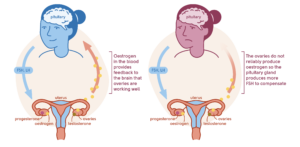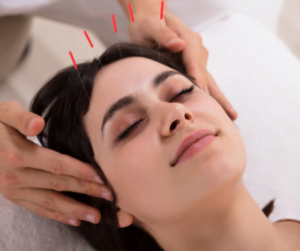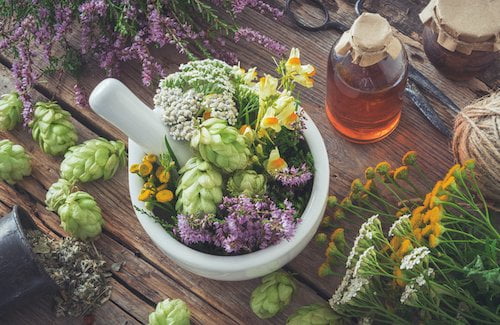Menopause is a natural phase in a woman’s life, marking the end of her reproductive years. While it is a normal transition, menopause can bring different physical and emotional changes, including anxiety. Anxiety during menopause is often linked to hormonal fluctuations, sleep disturbances, and other related factors. Instead of relying solely on pharmaceutical interventions, many women are turning to natural remedies to manage menopausal anxiety. In this blog, we’ll explore the causes of anxiety during menopause and delve into various natural remedies for menopause and anxiety that can help women navigate this transitional period with greater ease.
Contents
Relationship Between Menopause and Anxiety

The relationship between menopause and anxiety is complex and multifaceted, influenced by hormonal, psychological, and physiological factors. Menopause, typically occurring in women between the ages of 45 and 55, marks the end of reproductive years and is characterized by a natural decline in estrogen and progesterone production.
While not all women experience anxiety during menopause, a significant number report heightened levels of stress and anxiety-related symptoms.
Here’s an exploration of the key factors contributing to the relationship between menopause and anxiety:
Hormonal Fluctuations: Estrogen, primarily produced by the ovaries, is crucial in regulating mood and emotional well-being. During menopause, estrogen levels decline significantly. This hormonal shift can impact neurotransmitters like serotonin and norepinephrine, leading to changes in mood, including increased susceptibility to anxiety.
Neurotransmitter Imbalance:
- Serotonin Levels: Estrogen influences serotonin, a neurotransmitter associated with mood regulation. The decline in estrogen levels can result in lower serotonin levels, contributing to symptoms of anxiety and depression.
- GABA (Gamma-Aminobutyric Acid): GABA is an inhibitory neurotransmitter that promotes relaxation. Fluctuations in hormone levels during menopause may affect GABA activity, potentially leading to increased anxiety.
Physical Symptoms: Physical symptoms associated with menopause, such as hot flashes and night sweats, can be distressing and disruptive to sleep. Sleep disturbances are closely linked to anxiety, and the combination of these factors can contribute to heightened stress levels.
Psychological Factors: Menopause represents a significant life transition, often coinciding with other life changes such as children leaving home or career shifts. These transitions can contribute to emotional stress and anxiety.
Different Natural Remedies for Menopause and Anxiety
Managing menopausal symptoms, including anxiety, through natural remedies can be a holistic and effective approach. Here are various natural remedies that women experiencing menopause-related anxiety may consider:
Herbal Supplements

Herbal supplements have gained popularity as a natural remedy for managing menopausal symptoms, including anxiety. While it’s essential to approach herbal remedies with caution and consult with a healthcare professional, some herbs have shown promise in alleviating anxiety during menopause. Here are several herbal supplements commonly used for this purpose:
- Black Cohosh (Cimicifuga racemosa)
- Chasteberry (Vitex agnus-castus)
- Dong Quai (Angelica sinensis)
- Ginseng (Panax ginseng)
- St. John’s Wort (Hypericum perforatum)
- Valerian Root (Valeriana officinalis)
- Red Clover (Trifolium pratense)
- Passionflower (Passiflora incarnate)
- Evening Primrose Oil (Oenothera biennis)
Omega-3 Fatty Acids
Omega-3 fatty acids, particularly EPA and DHA, emerge as promising natural remedies for alleviating symptoms associated with menopause, including anxiety. These essential fats play a multifaceted role, contributing to mood regulation through their involvement in neurotransmitter synthesis, particularly serotonin.
DHA, a crucial component of the brain, supports cognitive function and could address cognitive symptoms linked to this life stage. By promoting cardiovascular health, omega-3s foster optimal blood flow to the brain, potentially influencing mood.
Vitamin B Complex
Vitamin B complex emerges as a valuable natural remedy for addressing menopausal symptoms, particularly anxiety.
B vitamins, including B6, B9 (folate), and B12, play crucial roles in neurotransmitter synthesis and regulation, impacting mood and emotional well-being.
These vitamins contribute to the production of serotonin and other neurotransmitters, providing a potential avenue for managing anxiety during menopause.
Additionally, vitamin B complex supports the nervous system, helping to mitigate stress and improve overall mental health.
As menopause can bring about hormonal fluctuations and emotional challenges, incorporating a variety of B vitamins through dietary sources like leafy greens, whole grains, and supplements may offer a holistic and supportive approach to promoting emotional resilience and well-being during this transitional phase of life.
Mind-Body Techniques
Mind-body techniques stand out as effective natural remedies for managing menopause-related anxiety.
- Practices such as yoga and meditation provide women with valuable tools to navigate the physical and emotional changes associated with this life stage.
- Yoga, with its emphasis on controlled breathing, gentle movements, and mindfulness, promotes relaxation, reduces stress, and enhances overall well-being.
- Similarly, meditation, through mindfulness and focused breathing, can help alleviate anxiety by calming the mind and fostering a sense of inner peace.
These mind-body techniques not only address the symptoms of anxiety but also contribute to improved sleep, increased emotional resilience, and a heightened sense of self-awareness. By incorporating these practices into their routine, women undergoing menopause can cultivate a positive mind-body connection, fostering a holistic approach to managing anxiety and promoting overall mental and emotional health.
Regular Exercise

Regular exercise emerges as a powerful and holistic natural remedy for managing menopause-related anxiety.
Engaging in physical activity, such as brisk walking, swimming, or yoga, not only promotes overall physical health but also has profound effects on mental well-being. Exercise triggers the release of endorphins, the body’s natural mood elevators, which can help alleviate anxiety and enhance mood during menopause.
Additionally, regular exercise contributes to better sleep quality, an essential aspect of emotional resilience. Beyond its physiological benefits, the sense of accomplishment and empowerment derived from maintaining an active lifestyle can positively influence self-esteem and body image, addressing emotional challenges that often accompany this transformative life stage.
Incorporating exercise into a daily routine becomes a cornerstone for women navigating menopause, offering a natural and holistic strategy to promote both physical and emotional well-being.
Aromatherapy
Aromatherapy emerges as a soothing natural remedy for alleviating symptoms of menopause, particularly anxiety.
- Essential oils such as lavender, chamomile, and bergamot, known for their calming properties, can be diffused or incorporated into relaxation routines to promote a sense of tranquility and emotional balance.
- Inhaling these fragrances stimulates the olfactory system, influencing the limbic system of the brain, which plays a key role in regulating emotions.
This Aromatherapy can serve as a simple yet effective self-care tool, providing women during menopause with a holistic approach to managing anxiety by engaging the senses and creating a serene and comforting environment.
Dietary Changes
Implementing dietary changes serves as a potent natural remedy for managing both menopause and anxiety.
- A balanced diet rich in omega-3 fatty acids, obtained from sources like fatty fish, flaxseeds, and walnuts, can help regulate mood and reduce anxiety during this life stage.
- Incorporating foods high in B vitamins, such as leafy greens and whole grains, supports the nervous system and contributes to emotional well-being.
- Phytoestrogen-rich foods like soy products may aid in balancing hormonal fluctuations that contribute to menopausal symptoms.
- Additionally, maintaining hydration and limiting caffeine and alcohol intake can positively impact mood and reduce the likelihood of exacerbating anxiety.
By embracing these dietary changes, women navigating menopause can empower themselves with natural strategies to promote both physical and emotional health during this transformative period.
Supportive Therapies

Supportive therapies present valuable natural remedies for managing menopause-related anxiety.
- Counseling or therapy provides a safe space for women to navigate the emotional challenges associated with this life transition, offering coping strategies and emotional support.
- Acupuncture, rooted in traditional Chinese medicine, is another supportive therapy that some women find beneficial for alleviating anxiety during menopause. This practice involves the insertion of thin needles at specific points on the body to balance energy flow and promote overall well-being.
- Support groups tailored to menopausal women foster a sense of community, enabling shared experiences and insights.
These supportive therapies contribute to a comprehensive and holistic approach to managing anxiety during menopause, addressing not only the physical but also the emotional and psychological aspects of this transformative life stage.
Herbal Teas
Herbal teas are increasingly recognized as natural remedies that offer soothing relief for symptoms of menopause, including anxiety. Certain herbs possess properties that can positively impact mood, promote relaxation, and address some of the emotional challenges associated with this life stage.
- Chamomile tea, known for its calming effects, contains compounds that may interact with receptors in the brain, contributing to a sense of tranquility and potentially reducing anxiety.
- Passionflower tea has been traditionally used as a natural remedy for anxiety and sleep disturbances, offering a gentle and non-habit-forming approach to promoting relaxation.
- Valerian root tea, with its sedative properties, may aid in alleviating anxiety and improving sleep quality.
The ritual of preparing and sipping herbal teas can also serve as a mindful practice, providing a moment of self-care and calm in hormonal changes. While herbal teas offer a comforting and natural option, individuals should consult with healthcare professionals, particularly if they are on medications or have specific health concerns, before incorporating these teas into their routine.
Conclusion
In conclusion, navigating the challenges of menopause, particularly anxiety, involves embracing a holistic and multifaceted approach that incorporates various natural remedies.
As with any health-related strategies, consulting with healthcare professionals ensures a tailored and safe approach, empowering women to embrace this journey with confidence and vitality.
If you are facing menopause-related issues, menopause treatment at HerMantra can help. Book your free trial online menopause treatment session now.


